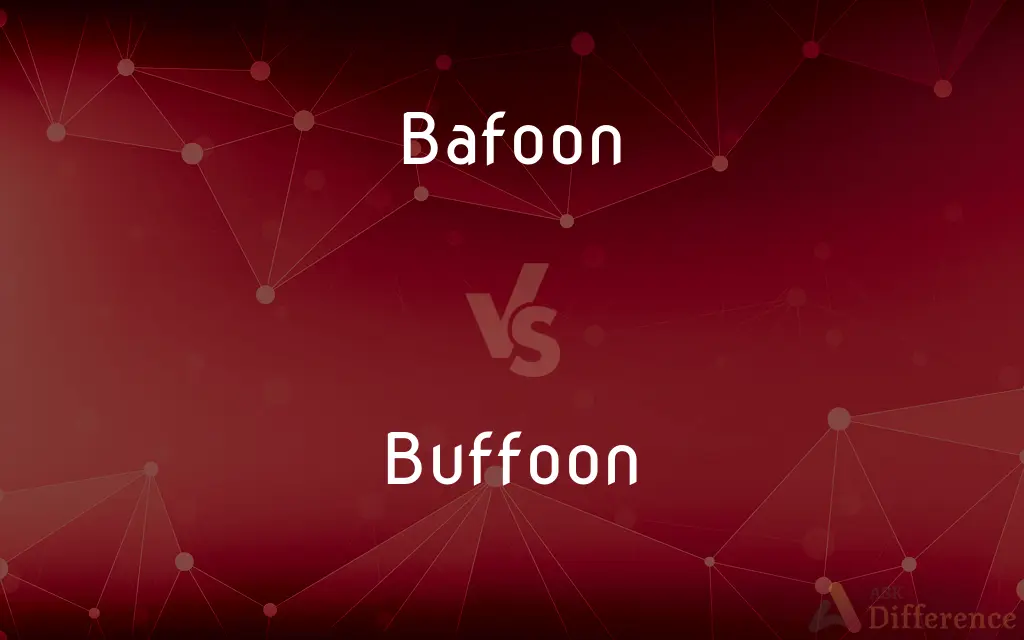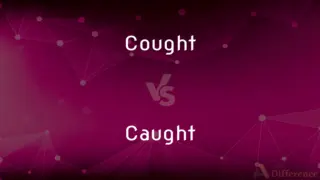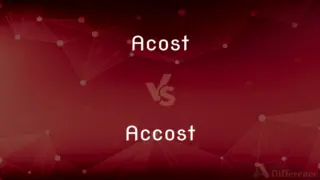Bafoon vs. Buffoon — Which is Correct Spelling?
Edited by Tayyaba Rehman — By Fiza Rafique — Updated on March 27, 2024
"Bafoon" is an incorrect spelling, while "buffoon" is the correct one. A buffoon is a person who behaves comically or foolishly.

Table of Contents
Which is correct: Bafoon or Buffoon
How to spell Buffoon?

Bafoon
Incorrect Spelling

Buffoon
Correct Spelling
ADVERTISEMENT
Key Differences
Use the mnemonic: "Don't be fooled by the extra 'f' and 'o'."
Envision a foolish person acting like a "buffoon" in a cartoon to reinforce the spelling.
Remember there are two 'f's and two 'o's in "buffoon."
Associate "buffoon" with a "full" clown or jester, hence the 'ff' and 'oo'.
Think of a "buffed" clown to remember the 'ff' in "buffoon."
ADVERTISEMENT
How Do You Spell Buffoon Correctly?
Incorrect: He dressed up as a baffoon for the Halloween party.
Correct: He dressed up as a buffoon for the Halloween party.
Incorrect: Don't be such a baffoon in public!
Correct: Don't be such a buffoon in public!
Incorrect: The movie character is such a baffoon, always getting into silly situations.
Correct: The movie character is such a buffoon, always getting into silly situations.
Incorrect: My uncle acts like a complete baffoon at family gatherings.
Correct: My uncle acts like a complete buffoon at family gatherings.
Incorrect: That comedian is a real baffoon on stage.
Correct: That comedian is a real buffoon on stage.
Buffoon Definitions
Buffoon refers to a clown, specifically one that intentionally acts foolishly.
The court buffoon entertained the king with his antics.
A person who lacks judgment or common sense can be termed a buffoon.
Don't listen to him; he's a complete buffoon!
In a derogatory sense, a buffoon is someone who tries to be funny but is actually embarrassing.
No one took the buffoon seriously at the meeting.
Historically, a buffoon was a jester who made jokes and played tricks to amuse others.
The medieval buffoon would often perform in the royal courts.
A clown; a jester
A court buffoon.
A person given to clowning and joking.
A ludicrous or bumbling person; a fool.
One who acts in a silly or ridiculous fashion; a clown or fool.
(pejorative) An unintentionally ridiculous person.
To behave like a buffoon
A man who makes a practice of amusing others by low tricks, antic gestures, etc.; a droll; a mimic; a harlequin; a clown; a merry-andrew.
Characteristic of, or like, a buffoon.
To divert the audience with buffoon postures and antic dances.
To act the part of a buffoon.
To treat with buffoonery.
A rude or vulgar fool
A person who amuses others by ridiculous behavior
A buffoon is someone who provides amusement through inappropriate humor or ridiculous behavior.
He played the part of the buffoon in the school play.
Buffoon Meaning in a Sentence
The play's character, a lovable buffoon, tripped over his own feet.
Everyone loves a buffoon who can bring light to a dull meeting.
The class clown was often called a buffoon by his teachers.
The buffoon at the carnival made all the children laugh.
At the party, he acted like a buffoon to make everyone laugh.
The king’s buffoon had the important job of cheering him up.
The storybook featured a buffoon who couldn’t stop telling jokes.
Every village has its buffoon, and ours was no exception.
In the movie, the buffoon accidentally becomes a hero.
A true buffoon, he wore his shirt inside out to the interview for laughs.
Playing the buffoon, he pretended to trip over the rug.
Trying to juggle, he looked more like a buffoon than a skilled performer.
The buffoon at the medieval fair was skilled at jousting.
At the zoo, the buffoon mimicked the monkeys, making everyone laugh.
He was the buffoon of the family, always ready with a prank.
The book's buffoon provided comic relief in a tense storyline.
Despite being a buffoon, he had a heart of gold.
A buffoon on the battlefield, he somehow always managed to survive.
Buffoon Idioms & Phrases
Acting the buffoon
Behaving in a foolish or comical manner to entertain others.
He was acting the buffoon at the party, making everyone laugh with his jokes.
A lovable buffoon
A person whose foolishness is endearing rather than irritating.
Despite his clumsy ways, he was a lovable buffoon who everyone adored.
Buffoon in the room
The most foolish or least sophisticated person in a group.
Feeling like the buffoon in the room, he decided to keep quiet during the discussion.
Playing the buffoon
Deliberately behaving foolishly for attention or to entertain.
Whenever she's bored, she starts playing the buffoon to lighten the mood.
A court buffoon
Someone who provides entertainment through foolish behavior, historically in a royal court.
The king always enjoyed the antics of his court buffoon, especially after a long day.
Buffoon at heart
Someone who is fundamentally playful and enjoys making others laugh, even if they don’t always show it.
She might seem serious, but she's a buffoon at heart, always ready with a quick joke.
A natural buffoon
Someone who is inherently silly or prone to foolish behavior without effort.
With his natural buffoon persona, he was the perfect fit for the comedy's lead role.
Common Curiosities
What is the verb form of buffoon?
There isn't a direct verb form, but "buffoonery" can refer to the act of behaving like a buffoon.
Why is it called buffoon?
The term "buffoon" comes from the Italian "buffone," which means "jester," representing someone who jests or acts foolishly.
What is the pronunciation of buffoon?
It is pronounced as [buh-FOON].
What is the root word of buffoon?
The root word is the Italian "buffone" meaning "jester."
What is the singular form of buffoon?
"Buffoon."
Which vowel is used before buffoon?
The vowel "a" can be used, as in "a buffoon."
Which conjunction is used with buffoon?
Any conjunction can be used based on the sentence structure, e.g., "and."
What is the plural form of buffoon?
"Buffoons."
Which preposition is used with buffoon?
"Of" can be used, as in "buffoon of a person."
Is buffoon an adverb?
No, "buffoon" is not an adverb.
Which article is used with buffoon?
"A" can be used before "buffoon" as in "a buffoon."
Is buffoon a noun or adjective?
"Buffoon" is a noun.
Is buffoon an abstract noun?
No, it refers to a tangible person, though it can represent a concept of foolishness.
Is buffoon a countable noun?
Yes, e.g., "There were three buffoons at the party."
Is buffoon a collective noun?
No, it's not.
How many syllables are in buffoon?
Two syllables.
Is buffoon a negative or positive word?
It is generally negative, referring to someone in a derogatory manner.
What is another term for buffoon?
Jester or clown.
Which determiner is used with buffoon?
Determiners like "that," "this," or "every" can be used, e.g., "that buffoon."
What is the second form of buffoon?
Buffoon does not have verb forms. The noun form is "buffoon."
What is the third form of buffoon?
Buffoon does not have verb forms. The noun form is "buffoon."
What is the opposite of buffoon?
Sage or wise person.
What is the first form of buffoon?
Buffoon does not have verb forms. The noun form is "buffoon."
How is buffoon used in a sentence?
"The comedian acted like a buffoon to get laughs from the audience."
How do we divide buffoon into syllables?
It's divided as buf-foon.
What part of speech is buffoon?
Buffoon is a noun.
Is buffoon a vowel or consonant?
"Buffoon" is a word consisting of both vowels and consonants.
Is the buffoon term a metaphor?
Not inherently, but it can be used metaphorically to describe someone's behavior.
Is the word buffoon imperative?
No, it's a noun and cannot be imperative.
What is the stressed syllable in buffoon?
The second syllable, "foon," is stressed.
Share Your Discovery

Previous Comparison
Cought vs. Caught
Next Comparison
Acost vs. AccostAuthor Spotlight
Written by
Fiza RafiqueFiza Rafique is a skilled content writer at AskDifference.com, where she meticulously refines and enhances written pieces. Drawing from her vast editorial expertise, Fiza ensures clarity, accuracy, and precision in every article. Passionate about language, she continually seeks to elevate the quality of content for readers worldwide.
Edited by
Tayyaba RehmanTayyaba Rehman is a distinguished writer, currently serving as a primary contributor to askdifference.com. As a researcher in semantics and etymology, Tayyaba's passion for the complexity of languages and their distinctions has found a perfect home on the platform. Tayyaba delves into the intricacies of language, distinguishing between commonly confused words and phrases, thereby providing clarity for readers worldwide.


































